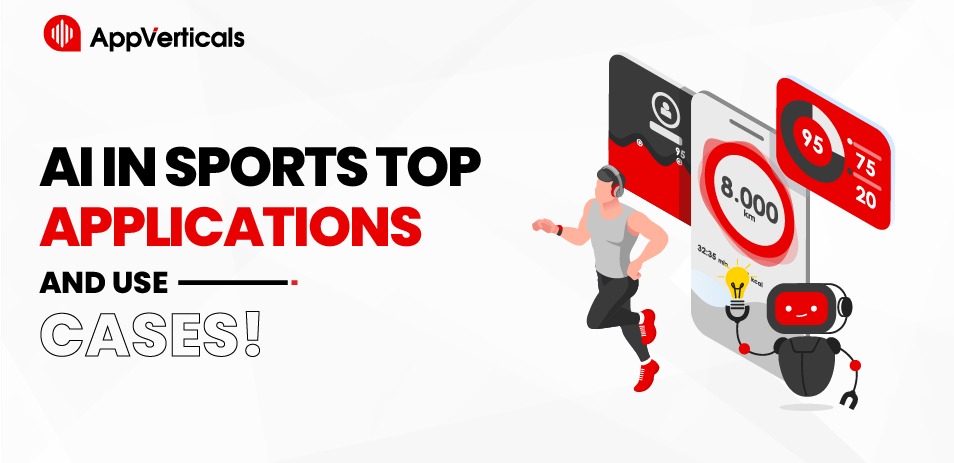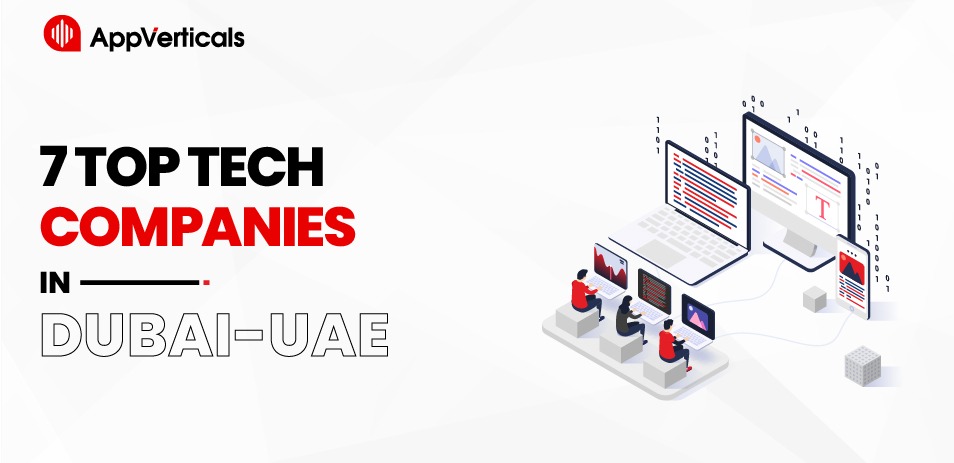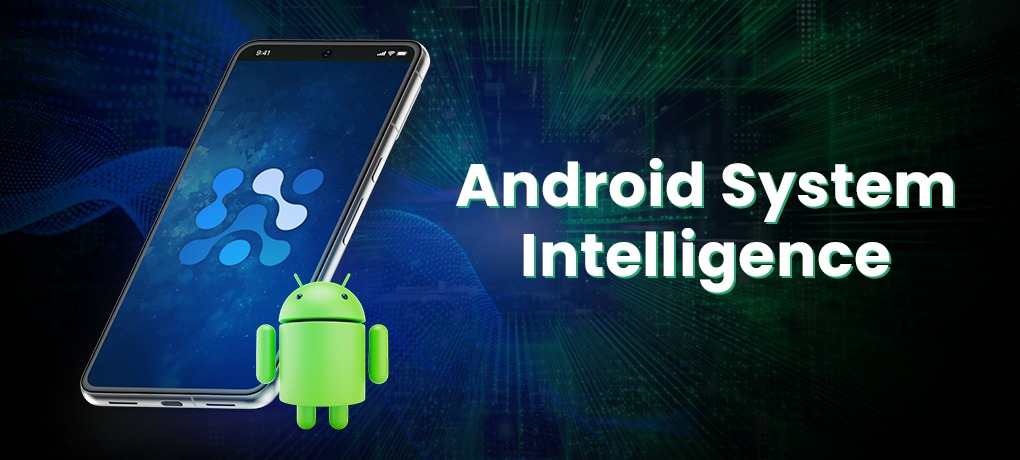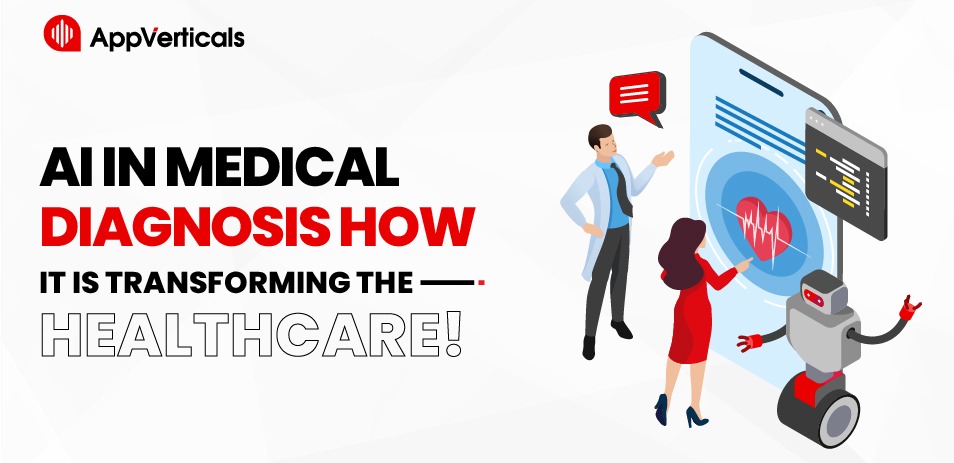The influence of AI in sports is growing quickly, and artificial Intelligence is changing many parts of the sports world. From improving player performance through data-driven insights to transforming how fans engage with their favorite teams, AI is bringing in a new era.
Teams, athletes, and organizations are using AI technologies more and more to boost performance, predict game outcomes, and connect with fans like never before.
Artificial Intelligence and sports work well together, especially in sports analytics. Machine learning algorithms analyze large amounts of player data, which helps coaches and managers make smart decisions. And, if you’re looking to create an app that uses AI for sports, the best app development company, like AppVerticals, is ever-ready to help you out.
In this article, we will look at how AI contributes to the sports industry and share some examples of AI in sports. Let’s discuss it in detail!
AI in Sports Analytics:
The market size of AI in sports is predicted to increase exponentially over the next few years. It is predicted to reach $6.69 billion in 2028, with a CAGR of 28.8%.
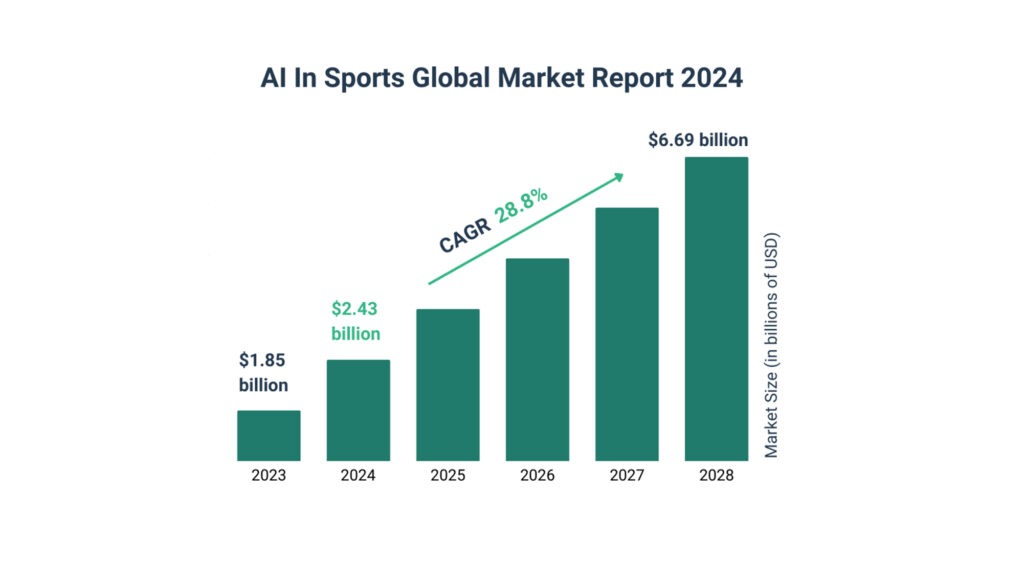
AI is having a big impact on sports, especially through sports analytics. Teams can now look at player performance, team strategies, and even how their opponents play.
In basketball, AI can predict when players are getting tired and suggest when they should take breaks.
This way, coaches keep their players performing at their best.
In football, teams use AI to track how players move on the field.
This helps them make better decisions for both defense and offense. Major sports leagues, like the NBA and the Premier League, are already using AI in their analytics.
AI is making the sports experience awesome while increasing the massive competition in the sports app industry. To make your app stand out, it is recommended that you remain updated on the top fantasy sports app development trends.
How AI Improves Sports Predictions
But now, with AI, predictions are much more accurate. AI tools can simulate different game scenarios, giving real-time predictions on how games might go.
By looking at factors like team setups, player injuries, and weather, AI is helping teams develop better strategies before and during games. This allows teams to anticipate their opponent’s moves and adjust their game plans as needed.
Top AI Applications in Sports Business:
From selling tickets to managing sponsorships, AI is helping sports businesses make smarter decisions, boost revenue, and run more efficiently. Let’s have a look at them:
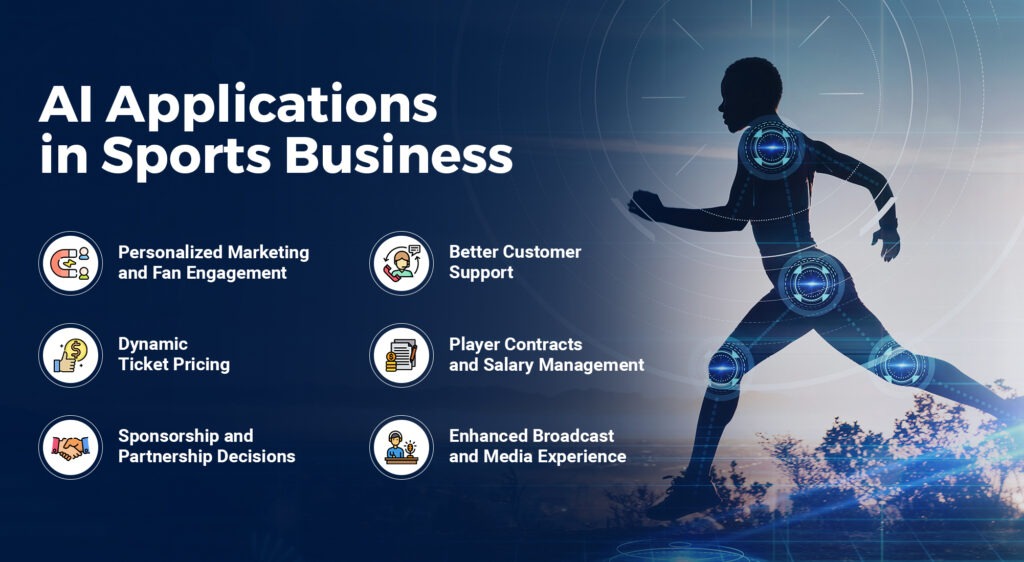
Personalized Marketing and Fan Engagement
AI helps sports businesses create personalized marketing campaigns by analyzing fan behavior, preferences, and past purchases. AI can suggest jerseys or event tickets based on what fans have browsed or bought before. This kind of personalization keeps fans more engaged and leads to more sales.
Dynamic Ticket Pricing
AI systems help sports organizations adjust ticket prices in real time based on factors like team performance, demand, and even the weather. This approach allows teams to maximize revenue by offering the right price at the right time.
For instance, if a team is doing well and demand is high, AI can raise ticket prices to match.
Sponsorship and Partnership Decisions
AI is used to track the success of sponsorships and partnerships. By analyzing factors like brand visibility and social media engagement, AI can show the value a sponsorship deal brings. This helps teams decide whether to renew deals or find new partners.
AI can also suggest potential partners by analyzing trends and audience data.
Better Customer Support
Sports organizations use AI-powered chatbots and virtual assistants to improve customer service. These AI tools handle ticket questions, give game updates, and help with purchases. This allows customer service teams to focus on more complex problems while AI takes care of routine tasks.
Player Contracts and Salary Management
AI helps teams analyze player performance and predict future outcomes, making it easier to negotiate player contracts. AI also helps manage salary caps by running simulations that show how contracts will impact a team’s budget in the future.
This allows teams to make smarter decisions when signing or renewing players.
Enhanced Broadcast and Media Experience
AI can create real-time highlights, deliver personalized content to fans, and enhance broadcasts with data visualizations and in-depth analysis. This makes the viewing experience more exciting and opens up new ways for broadcasters to make money.
The NBA uses AI to create personalized highlight reels for fans based on their favorite teams and players. This keeps viewers engaged and helps the league make more money through customized content.
Read also: Top sports apps!
How To Implement AI in the Sports App
Implementing AI can bring many benefits, but it requires careful planning, smart execution, and ongoing evaluation.
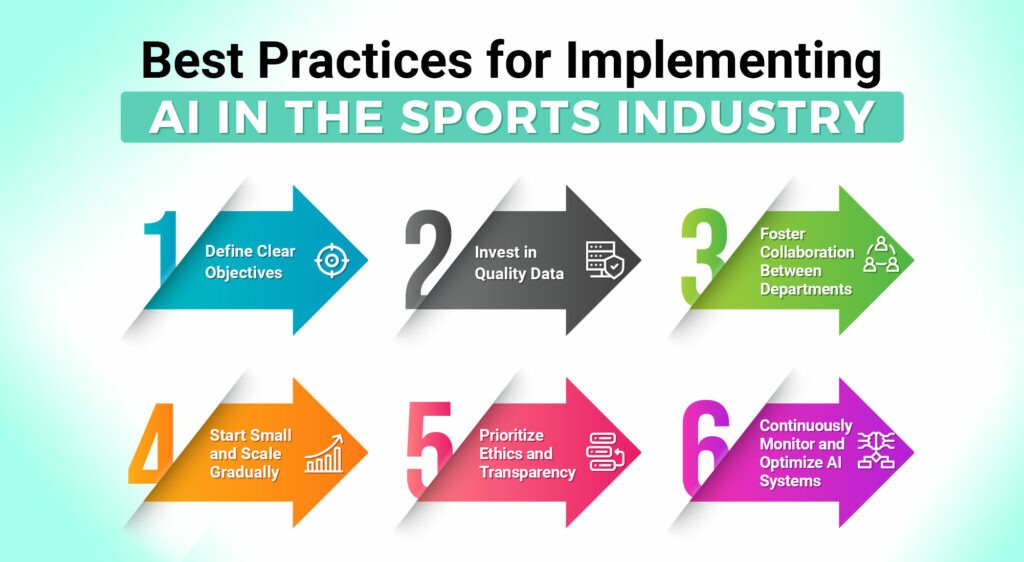
Define Clear Objectives
You should consider these questions:
- What problems are we trying to solve with AI?
- How will AI help our players, staff, and fans?
- What metrics will we use to measure success?
Clear objectives help organizations choose the right AI tools and strategies.
Invest in Quality Data
To make the most of machine learning in sports analytics, your app should have high-quality and reliable data. Here’s how to ensure quality data:
- Use different sources, like wearable devices, video analysis, and social media, to gather a wide range of data.
- Regularly clean and check data to ensure its accuracy. Bad data can lead to wrong predictions and poor strategies.
- Set up a system where data is stored in one place, making it easy for AI algorithms, analysts, and coaches to access.
Users require a user-friendly and engaging sports app. If you can’t manage it all, it is even better to consult the top sports app development company.
Foster Collaboration Between Departments
Successful AI implementation requires teamwork across various departments, such as coaching, analytics, marketing, and IT. Follow these two tips:
- Form teams with members from different departments to share knowledge and solve problems together.
- Offer staff training on AI technologies and how to understand data insights.
Start Small and Scale Gradually
Using AI can be complex, so it’s wise to start with smaller projects before expanding:
- Launch small test programs to evaluate AI tools in specific areas, like player health monitoring or fan engagement.
- Regularly review the results of pilot programs and make changes before rolling out full-scale implementations.
Prioritize Ethics and Transparency
As AI use in sports increases, ethical considerations become more important. Here are some key ethical considerations:
- Make sure all data collection follows privacy laws and respects athletes’ and fans’ rights.
- Regularly check AI systems for biases that could affect player evaluations or fan experiences.
- Include players, fans, and other stakeholders in discussions about AI to ensure their concerns are heard.
Continuously Monitor and Optimize AI Systems
AI technologies are not set-and-forget solutions; they need regular monitoring and optimization to stay effective. Evaluate how AI systems perform and make adjustments as needed:
- Create ways to gather feedback from users, like coaches and players, about AI-generated insights and recommendations.
- Keep up with the latest developments in AI technology and analytics to ensure the organization remains competitive.
Why Is AppVerticals The Best Sports App Development Company?
AppVerticals is a leading mobile app development company in Dallas that offers a mix of expertise, innovation, and a commitment to getting results. Here’s why we are the best app partner for bringing AI in sports apps.
- Expertise in AI Development
- Customized Solutions
- Innovative Technologies
- Data-Driven Insights
- Proven Track Record
- Commitment to Collaboration
- Future-Ready Solutions
Real-Life Use Cases of AI in Sports
Let’s look at some examples of how top clubs and leagues in different sports are using AI to make a difference.
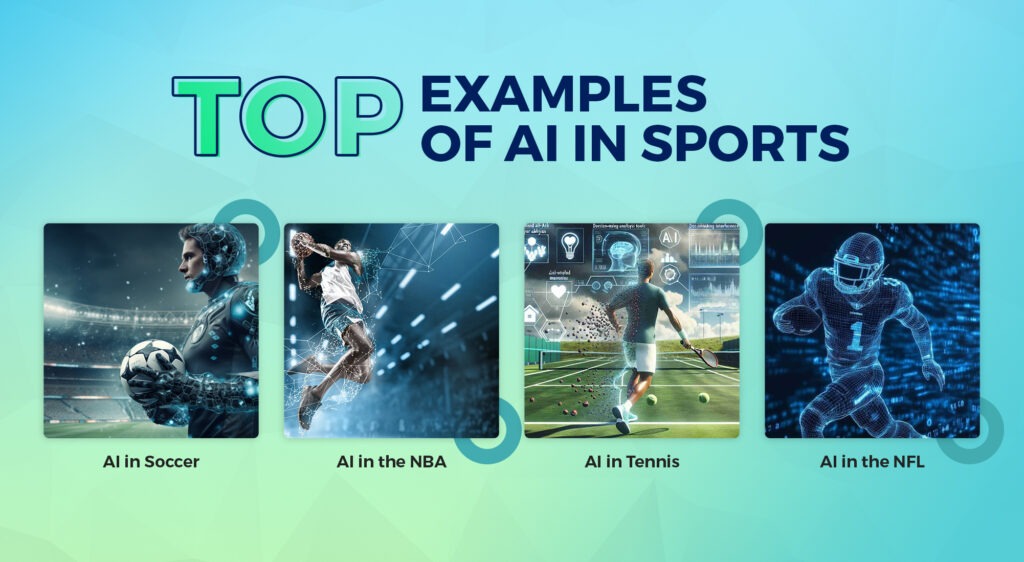
AI in Soccer
Soccer clubs like FC Barcelona and Manchester City are leaders in using AI to shape strategy and make better decisions when recruiting players.
FC Barcelona uses AI to track player movements during training and games. This data helps coaches make tactical changes by analyzing how players position themselves, pass the ball, and make decisions on the field.
Manchester City uses AI to help with recruitment. Machine learning systems analyze large amounts of player data from different leagues around the world to find players who would fit the team’s style.
This AI-driven approach helps clubs make smarter, data-based decisions without relying only on traditional scouting methods.
AI in the NBA
The NBA is a perfect place for AI to thrive due to the large amount of data available. Some NBA teams use AI to analyze player data from college and international leagues. The system can predict a player’s potential by looking at past performance, physical traits, and even personality, making scouting more accurate.
AI tools help teams monitor player fatigue and adjust their training loads to avoid injuries. During games, AI can also suggest real-time strategy changes based on data insights.
AI in Tennis
Tennis is another sport where AI is being used to analyze performance and predict match outcomes.
AI systems in tennis use cameras and sensors to track how players move, position their feet and hit the ball. Coaches use this data to improve player techniques and tactics.
AI platforms study past match data, player form, and factors like the type of court and weather to predict match results. This helps players plan better strategies and gives fans a more detailed look at the game.
IBM’s AI system, Watson, is used at big tournaments like Wimbledon to provide analysis and predictions. Fans can also get real-time stats and AI-driven insights, making the sport more engaging.
AI in the NFL
The NFL is using AI to improve game analysis, boost player performance, and strengthen team strategies.
AI tracks player movements, performance, and in-game decisions to determine which strategies work best. NFL teams can then study their opponents’ habits and adjust their game plans based on this data.
Wearable devices gather data on players’ speed, endurance, and the force of impact during training. AI systems use this information to create personalized training programs that improve performance and reduce injury risks.
The Dallas Cowboys use AI to simulate game scenarios, helping coaches prepare for different tactical situations.
Final Words
To use AI in sports, teams need to ensure their data is accurate, work together with experts, and stay up-to-date on the latest technology. AI will become even more important in sports, helping athletes perform better and making fans enjoy the games more.
As AI continues to improve, it’s important for teams, coaches, and fans to understand how it works and use it to their advantage.
FAQs
What is AI for sports?
AI for sports means using smart computer programs to help improve different parts of the sports world. This includes helping players perform better, figuring out game strategies, and making fan experiences more personalized. AI can gather and look at lots of data from games and players to give teams important information.
What is an example of AI in sports?
A good example of AI in sports is wearable technology used by athletes. Companies like WHOOP create devices that athletes wear to track their heart rate, how tired they are, and how well they recover. This information helps coaches make better training plans and keep players healthy. AI is also used in video analysis, where it looks at game footage to find key moments and strategies that can help teams prepare for upcoming games.
What is the future of AI in the sports industry?
The future of AI in the sports industry is very bright. As technology gets better, AI will help players perform even better and create more exciting experiences for fans. We can expect AI to make more accurate predictions about game outcomes and player performances. More sports apps will be developed using AI, offering fans personalized content and interactive features.
What companies are involved in sports AI?
Many companies are working with AI in sports. Some important ones include:
- IBM: They use AI to help teams analyze data, which improves player performance and fan experiences.
- Zebra Technologies: They provide technology that tracks players’ movements during games, giving teams useful insights.
- STATS Perform: This company focuses on sports data and uses AI to provide important information for teams and broadcasters.
- Catapult: They make wearable technology that helps track athlete performance during training and games. These companies are helping to change the way we experience sports through AI.
How is AI Used in the Sports Industry
AI in sports analyzes game stats and player metrics. This helps teams make smart, strategic decisions. For fan engagement, AI provides personalized updates and tailored experiences, keeping fans informed and connected. In terms of athlete performance, AI-driven wearables track important health metrics like heart rate and recovery. This data helps athletes train better and stay in top shape.

